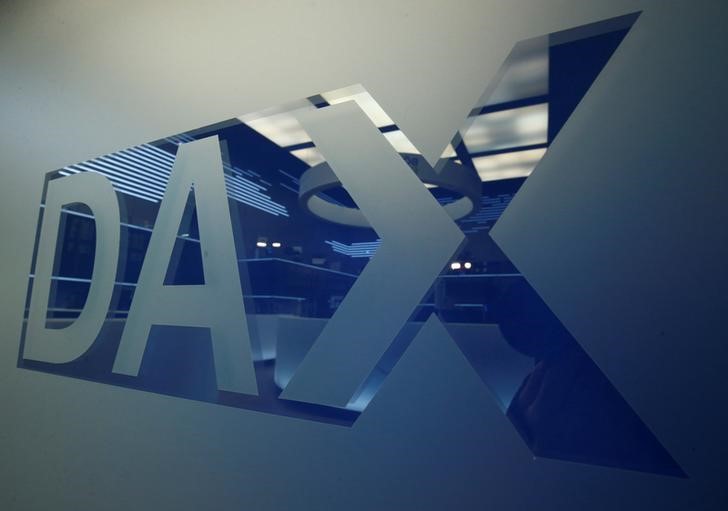* Graphic: World FX rates in 2019 http://tmsnrt.rs/2egbfVh
By Ritvik Carvalho
LONDON, Feb 8 (Reuters) - Global shares fell for a third straight day on Friday and were set to post their first weekly loss in seven, as investors worried about a broadening global economic slowdown and the lack of any sign of a resolution to the U.S.-China trade row.
Safe-haven government bonds benefited, with the German 10-year bund yield falling closer towards the zero percent mark and the U.S. 10-year Treasury yield hitting its lowest point in a week.
Weak earnings saw a subdued open for European stocks although most major indices climbed into the black for the day, putting the pan-European STOXX 600 .STOXX in positive territory. Spain's IBEX .IBEX fell half a percent. .EU
But stock markets in Asia earlier eased, with MSCI's broadest index of Asia-Pacific shares outside Japan .MIAPJ0000PUS shedding half a percent, easing back from a four-month peak touched the previous day.
The MSCI All-Country World Index .MIWD00000PUS , which tracks shares in 47 countries, was down 0.3 percent on the day. It was down for a third straight day and was set to break a six-week streak of gains.
The European Commission on Thursday slashed its forecasts for euro zone economic growth this year and next, stoking concern that a global slowdown is spreading to Europe as businesses and investors grapple with trade friction. Bank of England on Thursday said Britain faces its weakest economic growth in a decade this year, as uncertainty over Brexit mounts and the global economy slows. in the week, Australia's central bank signalled monetary easing in the face of economic headwinds, joining the U.S. Federal Reserve and the European Central Bank in signalling policy shifts. The Fed has all but abandoned plans for further rate hikes, while the ECB also sounded less certain that it will start tightening policy this year.
"If there was a single takeaway from the last few days it would appear to be this - ever since the Fed started to backtrack on its growth expectations for the U.S. economy, the global economic skies, to coin an aphorism from the recent World Bank report, have started to darken further," said Michael Hewson, chief markets analyst at CMC Markets in London.
In a report last month titled 'Darkening Skies', the World Bank said global economic growth is expected to slow to 2.9 percent in 2019, compared with 3 percent in 2018. added that the tone in markets on the day wasn't helped by remarks from U.S. President Donald Trump's chief economic adviser Larry Kudlow, that U.S.-China trade talks still had sizable differences to overcome.
Trump himself said on Thursday he did not plan to meet Chinese President Xi Jinping before a March 1 deadline set by the two countries to achieve a trade deal. Treasury Secretary Steven Mnuchin and Robert Lighthizer are expected to kick off another round of trade talks in Beijing next week to push for a deal to protect American intellectual property and avert a March 2 increase in U.S. tariffs on Chinese goods.
The 10-year U.S. Treasury yield US10YT=RR extended its overnight decline to a one-week low of 2.643 percent. The 20-year Japanese government bond yield JP20YTN=JBTC dropped to a 27-month trough of 0.400 percent.
The 10-year German bund yield DE10YT=RR fell to 0.105 percent on Thursday, its lowest since November 2016 after the European Commission's sharp cuts to growth and inflation forecasts. GVD/EUR
The euro was on course for its biggest weekly loss in more than four months against the dollar, though traders seemed to be puzzled that it was finding support. The single currency was 0.1 percent lower on the day at $1.13240 EUR= after dropping to a two-week low of $1.1325 the previous day.
It was on track for a 1 percent weekly loss.
Against a basket of currencies, the dollar was 0.15 percent higher. .DXY
The Australian dollar was on course to end a bearish week firmly on the back foot, last trading down 0.25 percent at $0.7083 AUD=D4 .
The Aussie slid sharply on Wednesday after the Reserve Bank of Australia stepped back from its long-standing tightening bias, saying the next move in rates could just as well be down as up. The currency was headed for a weekly loss of 2.3 percent.
In commodities, oil fell, pulled down by worries over a global economic slowdown, although OPEC-led supply cuts and U.S. sanctions against Venezuela provided crude with some support. O/R
U.S. crude futures CLc1 slipped half a percent to $52.39 per barrel, extending losses after dropping 2.5 percent in the previous session. Brent crude LCOc1 was down 0.3 percent at $61.47 per barrel.
